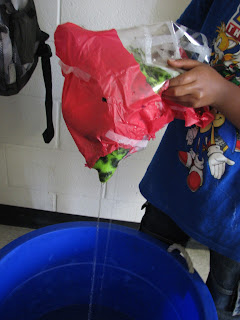1) How do you measure wetness?
2) How can you get a structure to float AND sink? (i.e. How can you transform a boat into a submarine?)
3) How much helium can fit into a typical party balloon? How many balloons are we going to need to be able to get our contraptions to get off the ground?
This uncertainty has been a lot of fun, believe it or not. Sure, we try to search for answers with our digital tools and they help, sometimes. Occasionally the actual answer is too sophisticated for me to comprehend or for me to teach my 8 year-old students. We theorize. We estimate. We hypothesize and then test out our ideas.
 |
| Our waterproof outfits - which did the best job? |
 |
| Four of our boats - only a few were converted to subs. |
Sometimes our ideas don't always come to fruition in the way we'd like, which leads me to the second part of this week's reflection. With very few exceptions, the vast majority of our assignments have multiple opportunities for "do-overs". The final grade isn't final until the students indicate that it is. I really like how some of my students have started to put sticky notes on pages in their notebooks that they'd like me to take another look at, because they've read my initial feedback and made some adjustments that they think will improve their work. Often, they are right, and their newer thoughts result in adjusted (and higher) grades.
One student was really determined to get his submarine to go all the way underwater without getting his Webkinz inside soaked. He must have rebuilt his invention at least four times, if not more. He discovered early on to put a proxy for his Webkinz pet in his prototype, because "failure" meant that his toy got wet. (He took it home to dry, but poor BullsEye still has a bit of an odor to him.)
 |
| Student "Pa" measuring and cutting the plastic for his sub |
 |
| Prototype #2 - sank very well, but still wet inside |
 |
| Prototype #1 - too unstable & porous = wet Webkinz! |
I really wish that I could do this (explore really challenging questions and provide multiple opportunities to re-assess tasks after providing feedback) more often in my regular school program. The hard question for me will be to figure out how to do it when I'm a prep delivery teacher with limited time with classes.






Diana, I wonder if you could. Is there a way to pair with some homeroom teachers, so that you can extend their classroom inquiry learning through your prep coverage? You may or may not be offering a mark on this work, but you could still offer feedback, and provide lots of these experiment and "do over" options. Inquiry works best with large blocks of time to explore, and while you may only have a short block, coupled with others, your block is much longer. I have no doubt that you also bring another set of skills to the inquiry that would be appreciated by other teachers. This is something that I've had the pleasure of doing with Phys-Ed and Music teachers, and the results have been fantastic. What do you think? I'd love to know if you give something a try, and how it goes.
ReplyDeleteAviva
Thank you for replying Aviva. There's a bigger chance that I can do this in the upcoming year, because I have some open collaborative time in my teacher-librarian schedule. (It was much more challenging before.) Would you be willing to share (either on your blog or in the comments below) how you arranged this type of inquiry with your Phys-Ed & Music teachers?
DeleteI'm so glad to hear that this might be able to work out for this upcoming year. Here are some blog posts that I wrote in the past couple of years about how the Music Teacher and Phys-Ed Teacher got involved in our current inquiries:
Deletehttp://adunsiger.com/2014/01/31/dream-big-dont-be-afraid-to-ask-for-help/
http://missdunsiger.commons.hwdsb.on.ca/2014/02/12/daily-shoot-miss-dunsigers-class-day-101/ (Scroll down to the middle of this one.)
http://adunsiger.com/2014/10/31/good-alone-better-together/ (See the part about Frank Ferrante.)
http://missdunsiger.commons.hwdsb.on.ca/2015/01/20/daily-shoot-miss-dunsigers-class-day-88-2/ (Explained in the Math/Science/Phys-Ed Part, and you can see the tweets too.)
I hope this helps!
Aviva
Thank you Aviva. I'm going to read and re-read the links so I can see what other elements must be in place (other than a will to make it happen).
DeleteLove how you lay out the many important phases of inquiry here! Would love to be a student in your class and I am confident that you will manage to make these learning opportunities happen next year too!
ReplyDeleteThanks for the support, Jen. I hope I will be able to apply my summer school learning effectively. My attempt this year (with personalized notebooks) didn't go very well - I guess doing it for 16 students is a lot different than doing it for 100 (my 5 media classes of 20 students each)!
Delete